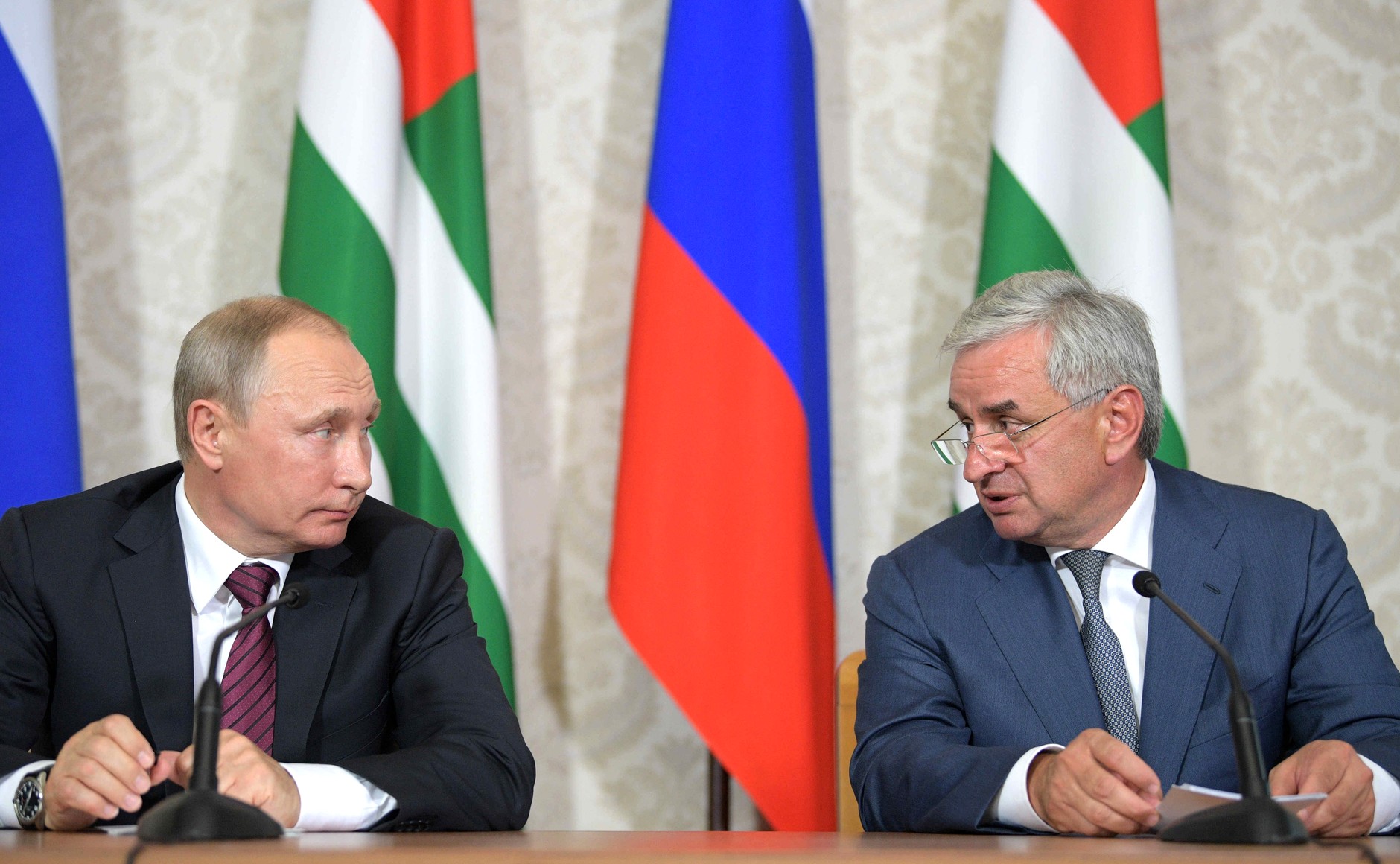Putin Visits Abkhazia, Discusses Defense, Police Cooperation

Vladimir Putin and Raul Khajimba in Bichvinta. August 8, 2017. Photo: Kremlin
Russia’s President Vladimir Putin met Moscow-backed Abkhaz leader Raul Khajimba in Bichvinta (Pitsunda), a town in the occupied region, on August 8 to discuss Moscow’s ties with Sokhumi in the fields of defense, police, economy and healthcare.
The meeting came on the ninth anniversary of the Russian-Georgian war, a week after Vice President Mike Pence visited Georgia.
“I am happy to be in Abkhazia, on the Abkhaz soil,” Vladimir Putin told Khajimba in his remarks before the meeting. “We have a very special relationship with Abkhazia: we provide a reliable guarantee of security and independence of Abkhazia, and I am sure that this will continue in the future as well.”
Speaking on the meeting agenda, Vladimir Putin said the two would discuss defense cooperation, including the development of the joint Abkhaz-Russian military unit and the joint information-coordination center, a 20-member unit of Russian and local police agencies, the establishment of which caused controversy in the region.
“It, of course, is a very important component [of the Russian-Abkhaz relations]: both the citizens of Abkhazia and the guests, regardless of where they come from, must understand and feel that they are secure,” Putin noted on the joint center, expressing his hopes that the combined work of police agencies “would increase the level of security of tourists” in Abkhazia.
In his remarks before the meeting, Raul Khajimba expressed gratitude to Vladimir Putin for his personal, as well as Russia’s support to Sokhumi and said that “thanks to the Russian Federation, Abkhazia is advancing on its path to social-economic development, infrastructure-building, and is resolving the defense and security questions.”
The Abkhaz leader touched upon the information-coordination center as well, saying that the agreement on its establishment was ratified by the local legislature and that the institution “will be an important instrument in the fight against crime.” “It is crucial for Abkhazia that its residents and guests live in comfortable conditions,” Khajimba also noted, referring to the wide-spread concerns of locals and tourists in Abkhazia over the region’s growing crime rate.
Khajimba also said that August 8 is “a memorable date for the Republics of Abkhazia and South Ossetia: on this day, the Georgian army started a large-scale operation, and the decisive actions that were taken by the Russian leadership made it possible to preserve the Republic of South Ossetia and Abkhazia and, of course, enabled the further recognition of our small states, for which we are very grateful.”
Speaking after the meeting, Vladimir Putin said “a lot of work has been done and important results have been achieved in strengthening the statehood of the [two] republics” since Russia’s recognition of Georgia’s two regions nine years ago.
“Abkhazia is an important partner and an ally of Russia, with which we share a common history and a spiritual kinship. Russia will continue to contribute to the socio-economic development of Abkhazia, ensure its security, and provide full political support.”
President Putin spoke on Russia’s financial support in the region, including in tourism, agriculture and food production. “The Republic of Abkhazia has very good opportunities to further increase the supply of products to the Russian market, considering the restrictions [imposed by the Russian Federation] on agricultural products from certain countries,” he added.
Putin also noted that the Abkhaz leader raised the issue of easing the customs clearance procedures and the work of the phytosanitary services, where the two “have certain ideas that will be realized in the near future.”
The issue of the joint information-coordination center resurfaced again, with Vladimir Putin saying that its objective is “to increase the effectiveness of joint [Abkhaz-Russian] efforts in countering crime.” “This is very important, including for ensuring safety of Russian tourists in Abkhazia.”
The Russian President said the two touched upon the security situation in the South Caucasus as well, saying that the Russian military base in Abkhazia “continues to play a key role in ensuring stability in the region.”
The Abkhaz leader spoke on the meeting details as well. He said the meeting “was held in traditionally friendly and constructive atmosphere and was extremely useful in terms of common interests of Abkhazia and Russia.”
On the joint information-coordination center, Khajimba said the new unit “will be a serious and effective tool in helping to address the issue of combating crime.” He also said work continues on establishing “a common framework of defense and security,” and on coordinating external policies of Moscow and Sokhumi.
“The Republic of Abkhazia was, is and will be a steadfast ally and a friend of Russia. I am confident that the productive Abkhaz-Russian cooperation, based on the principles of alliance and strategic partnership, will continue to further develop for the benefit of our peoples.
As part of the visit, Russian Healthcare Minister Veronika Skvortsova and her Abkhaz “counterpart” Tamaz Tsakhnakia signed an agreement extending Russia’s compulsory medical insurance program to Russian citizens living in Abkhazia.
Tbilisi’s Reaction
The Georgian Ministry of Foreign Affairs condemned the “visit” of the Russian President “to the occupied Abkhazia region in violation of the Georgian state border,” saying that it “represents a continuation of Moscow’s deliberate policy against Georgia,” and “blatantly infringes the fundamental norms and principles of international law.”
“Such action at the 9th anniversary of the Russia-Georgia war serves for legitimization of forceful change of borders of the sovereign state through military aggression, ethnic cleansing and occupation,” the Ministry stated and added that “by this step, the Kremlin tries in vain to support and legitimize its occupation regimes.”
The Foreign Ministry called upon the Russian Federation “to cease its provocative actions against the Georgian statehood and respect the territorial integrity of the sovereign state,” and appealed to the international community “to duly assess Moscow’s aggressive steps and take effective measures to ensure that the Russian Federation fulfills its international obligations, including the August 12 2008 Ceasefire Agreement.”
This post is also available in: ქართული (Georgian) Русский (Russian)